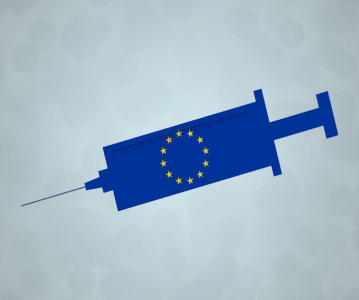Merck and Moderna collaborate to advance novel mRNA-based personalised cancer vaccines with Keytruda

Collaboration combines Merck’s leadership in immuno-oncology with Moderna’s pioneering mRNA vaccine technology and rapid cycle time, small-batch GMP manufacturing capabilities.
Merck (MSD) and Moderna Therapeutics have announced a strategic collaboration and license agreement to develop and commercialise novel messenger RNA (mRNA)-based personalised cancer vaccines. The collaboration will combine Merck’s established leadership in immuno-oncology with Moderna’s pioneering mRNA vaccine technology and GMP manufacturing capabilities to advance individually tailored cancer vaccines for patients across a spectrum of cancers.
Moderna and Merck will develop personalised cancer vaccines that utilise Moderna’s mRNA vaccine technology to encode a patient’s specific neoantigens, unique mutations present in that specific patient’s tumour. When injected into a patient, the vaccine will be designed to elicit a specific immune response that will recognise and destroy cancer cells. The companies believe that the mRNA-based personalized cancer vaccines’ ability to specifically activate an individual patient’s immune system has the potential to be synergistic with checkpoint inhibitor therapies, including Merck’s anti-PD-1 therapy, Keytruda (pembrolizumab). In addition, Moderna has developed a rapid cycle time, small-batch manufacturing technique that will uniquely allow the company to supply vaccines tailored to individual patients within weeks.
Under the terms of the agreement, Merck will make an upfront cash payment to Moderna of $200 million, which Moderna will use to lead all research and development efforts through proof of concept. The development program will entail multiple studies in several types of cancer and include the evaluation of mRNA-based personalised cancer vaccines in combination with Merck’s Keytruda (pembrolizumab). Moderna will also utilise the upfront payment to fund a portion of the build-out of a GMP manufacturing facility in suburban Boston for the purpose of personalised cancer vaccine manufacturing.
Following human proof of concept studies, Merck has the right to elect to make an additional undisclosed payment to Moderna. If exercised, the two companies will then equally share cost and profits under a worldwide collaboration for the development of personalised cancer vaccines. Moderna will have the right to elect to co-promote the personalised cancer vaccines in the US. The agreement entails exclusivity around combinations with Keytruda. Moderna and Merck will each have the ability to combine mRNA-based personalised cancer vaccines with other (non-PD-1) agents.
“Combining immunotherapy with vaccine technology may be a new path toward improving outcomes for patients,” said Dr Roger Perlmutter, president, Merck Research Laboratories. “While the area of personalised cancer vaccine research has faced challenges in the past, there have been many recent advances, and we believe that working with Moderna to combine an immuno-oncology approach, using Keytruda, with mRNA-based personalised cancer vaccines may have the potential to transform the treatment of cancer.”
“Our team has made significant progress since beginning our work in personalised cancer vaccines just last year. Through this collaboration with Merck, we are now well-positioned to accelerate research and development with a goal of entering the clinic in 2017, as well as to apply our unique GMP manufacturing capabilities to support the rapid production of these highly individualised vaccines,” said Stéphane Bancel, CEO of Moderna. “We value our continued collaboration with Merck, and we look forward to working together to harness the potential of personalised cancer vaccines and immuno-oncology to bring a new treatment paradigm to patients.”
Related News
-
News Patients vs Pharma – who will the Inflation Reduction Act affect the most?
The Inflation Reduction Act brought in by the Biden administration in 2022 aims to give better and more equitable access to healthcare in the USA. However, pharma companies are now concerned about the other potential costs of such legislation. -
News CPHI Podcast Series: What does the changing US Pharma market mean for industry and patients alike?
In this week's episode of the CPHI Podcast Series Lucy Chard, Digital Editor for CPHI Online is joined by James Manser to discuss the political and market changes in the US pharma field. -
News CPHI Barcelona Annual Report illuminates industry trends for 2024
The CPHI Annual Survey comes into it’s 7th year to report on the predicted trends for 2024. Over 250 pharma executives were asked 35 questions, with their answers informing the industry landscape for the next year, spanning all major pharma marke... -
News Which 10 drugs are open to price negotiation with Medicare in the USA?
The Centres for Medicare & Medicaid Services, under the Biden administration in the USA, has released a list of the 10 drugs that will be open to price negotiations as part of the new legislation under the Inflation Reduction Act (IRA). -
News EU Medical Devices Regulation causes unintended disappearances of medical devices for children, doctors state
Doctor groups and associations have appealed to the EU to correct the EU Medical Devices Regulation law that may cause unintended shortages of essential drug and medical devices for children and rare disease patients. -
News 10 Major Drug Approvals So Far in 2023
Last year, 37 novel drugs were approved by the FDA, this was a high number for such a category, and covered many fields including oncology, demonstrating how promising further research is, and how it is only continuing to build. To date, there are alre... -
News Detecting Alzheimer's disease with a simple lateral flow test
A novel rapid diagnostic test for early-stage Alzheimer's disease has been developed using a biomarker binder from Aptamer Group along with technology from Neuro-Bio, the neurodegenerative disease experts. -
News CPHI Podcast Series: outsourcing and manufacturing trends
Listen to the CPHI Podcast Series this June to hear Gil Roth of the PBOA speak with Digital Editor Lucy Chard about the biggest trends and topics to watch in pharma outsourcing and manufacturing at the minute.
Position your company at the heart of the global Pharma industry with a CPHI Online membership
-
Your products and solutions visible to thousands of visitors within the largest Pharma marketplace
-
Generate high-quality, engaged leads for your business, all year round
-
Promote your business as the industry’s thought-leader by hosting your reports, brochures and videos within your profile
-
Your company’s profile boosted at all participating CPHI events
-
An easy-to-use platform with a detailed dashboard showing your leads and performance







